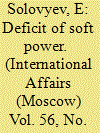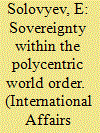| Srl | Item |
| 1 |
ID:
100339


|
|
|
|
|
| Publication |
2010.
|
| Summary/Abstract |
ENERGY REMAINS one of the most important factors in the present-day world. Oil, gas, power engineering and the nuclear power industry constitute the core of Russia's modern economy, making it a serious player on the international arena, a true energy superpower. Oil, oil products and natural gas account for two-thirds of Russian exports. The oil and gas sector largely predetermines Russia's geopolitical positions and its role in ensuring the energy security of the globalizing world. Not surprisingly, the energy factor is regarded as one of the most important means of invigorating our cooperation with the CIS countries and even as an instrument of projecting Russia's power to different countries in the post-Soviet space.1 At the same time the energy sphere is a field of serious conflicts in the modern world. Suffice it to mention the wish of China, the U.S., and some EU countries to secure direct access to the oil and gas resources of Central Asia. Maintenance of its stature as an energy power and the expansion of its capabilities in the energy sphere are in fact closely linked to Russia's ability to strengthen its positions in the neighboring states, primarily in the Caucasus and Central Asia. However, achieving this only through traditional diplomatic methods of the past one and a half to two decades is a complex, almost unfeasible task.
|
|
|
|
|
|
|
|
|
|
|
|
|
|
|
|
| 2 |
ID:
138055


|
|
|
|
|
| Summary/Abstract |
FOR A LONG TIME, Russian researchers remained riveted to the problem of resource deficit in the world as a potential cause of international instability or even conflicts. In recent years, however, we are growing increasingly aware of deficit of confidence, a resource which is equally important for world economy and world politics and which, therefore, can be described as universally important. There is a deficit of confidence in the basic institutions, the rules of the game and among the main actors which do not trust what others are doing and plan to do. The trends of world development depend on how fast and to which extent we will be able to deal with this fundamental deficit. The events unfolding in Ukraine and around it with no end in sight do not breed optimism.
|
|
|
|
|
|
|
|
|
|
|
|
|
|
|
|
| 3 |
ID:
143727


|
|
|
|
|
| Summary/Abstract |
IN 1992, FRANCIS FUKUYAMA brought "the good news" of the end of history: Liberal democracy had won, putting an end to the "history of conflicts" between states. Classical bipolarity had become a thing of the past. The Cold War ended in the "complete triumph" of the West (Western interpretation) to be replaced with tectonic shifts in the system of international relations. Politicians and experts spoke about the Soviet Union's disintegration as the end of history of ideological conflicts and a logical death of geopolitics, a product of the imperfect balance of power of the New Times that developed into the bipolarity of the Cold War to arrive at the consolidated, stable and manageable unipolar world - the "new world order." In this context, "the end of history" looks logical. Liberal norms and institutes as well as problems of economic development have moved into the place previously occupied by geopolitics and political realism concerned with the balance of power, problems of security and structural factors. Diplomats discarded the no longer needed security issues to concentrate at trade and climate change; the United States tempted by the idea of the end of geopolitics appreciated the possibility to minimize the maintenance costs of the world order and enjoy the advantages of globalization and open world markers. The Europeans, likewise, profited from the new unipolar world order. They used the chance to expand to the East and spread their soft power and influence on a global scale.
|
|
|
|
|
|
|
|
|
|
|
|
|
|
|
|
| 4 |
ID:
107849


|
|
|
| 5 |
ID:
137315


|
|
|
|
|
| Summary/Abstract |
THROUGHOUT the last three decades, the system of international relations has changed beyond recognition. Classical bipolarity has become a fact of history while the world has become aware of paradoxes of globalization and transformation of world politics. On the one hand, the human community has become an indivisible and interconnected whole. Globalization suggests cooperation in the face of common problems; adoption of common norms and rules of conduct in world politics; improvement of the old and creation of new efficient international institutions. On the other hand, globalization, responsible for the uneven development pace and emergence of a vanguard group of states and transnational forces (including the TNCs) which enjoys all the advantages offered by globalization, exacerbates a wide range of problems and causes grave economic and political crises and social upheavals.
|
|
|
|
|
|
|
|
|
|
|
|
|
|
|
|
| 6 |
ID:
157254


|
|
|
|
|
| Summary/Abstract |
ELECTION OF DONALD TRUMP and his active efforts to undermine the foreign and domestic policy course inherited from the Obama administration sent waves of concern across the Western analytical community. His inaugural address had a bombshell effect on Western mainstream media. His close to perfect populist speech (calling "to drain the Washington swamp" and "give power back to the people") was nationalist at the brink of "isolationism."1 He looked like a perfect right-wing populist and no exception to the common rule: clearly defined problems and real and urgent questions never supplied with clear (or rational) answers.
|
|
|
|
|
|
|
|
|
|
|
|
|
|
|
|